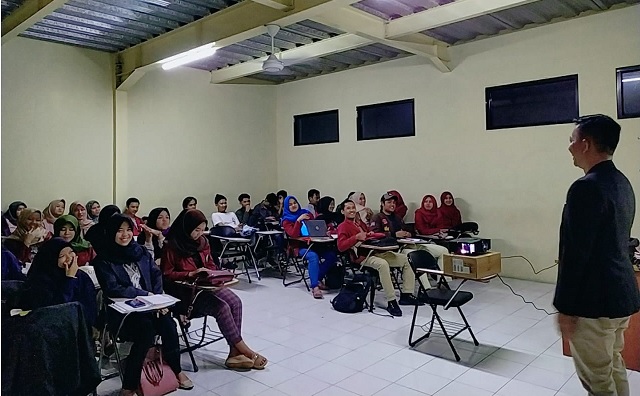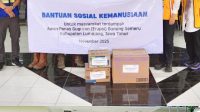BANDUNG BARAT, LENSAJABAR.COM — Friday in February 07, 2020, have run seminar at STEI LPPM about How to Increase Our Confidence and Our Syariah Financial. This seminar attended by more or less 70 people, they are Lecturers, University Students and Bandung Barat people.
In this moment, R. Dewi Rahma Sari, S.S., MA. She is a Lecturer of STEI LPPM Bandung – Barat, Head of Halal Tourism from Syariah Economic Society and also founder of Dewi Rahmasari Education and Care as the first speaker say Confidence is a key ingredient in influence and an important trait of any successful leader. In another Psychology Today article, Maureen D. Healy called it a skill to be mastered. There is no ‘magic pill’ that you take, and boom — you wake up feeling confident from the inside out. But there are certain ways to think, feel and be in the world that nudge you forward and help you develop the skill.
Confidence is a skill, you can develop, build and grow that skill by focusing on it every day just as you can grow it with the right training regimen. Here are ways you can be, think and feel that will enhance your confidence – thereby making you more influential and more likely to be followed.
1. Be generous with praise and acknowledgement. Acknowledging others has an impact on how you feel about yourself.
2. Integrate your superpowers into everything you do. When you’re practicing your strengths, you are operating at a high level of achievement and delivering exceptional value. That means you need to know what your strengths are and rethink everything you do every day to integrate those superpowers.
3. Take a stand/have a point of view.Confident people aren’t wishy-washy – trying to be all things to all people. They are willing to take a stand knowing that not everyone is going to agree with them.
4. Embrace challenge. Be resilient and push through challenges that impede the path to success. Don’t be stopped by them. Get used to the fact that anything worth accomplishing is likely to require mastering a challenge or two.
5. Listen. When you truly listen, three things can happen. You learn something, you build stronger relationships and you increase your productivity. Yet, in our doing culture, listening is one of the least mastered communications skills. Recalling lessons from his father, Sir Richard Branson emphasized the importance of learning about listening in a recent LinkedIn post: “Listen more than you talk. Nobody learned anything by hearing themselves speak.”
6. Don’t take yourself too seriously. When you do, you risk focusing too much on the details, closing your mind to valuable input or advice and coming off as arrogant, not confident. Be willing to laugh at yourself and acknowledge the things that aren’t your greatest skills.
7. Take risks. When you proactively take risks, you are unsure of the outcome, but that process is the key to learning and growing. People with little self-confidence always play it safe. Confident people take calculated risks.
8. Avoid the Lone Ranger syndrome. Being able to ask for help is not a sign of weakness. It is a sign of strength. In fact, it shows confidence because you’re not afraid to share the glory if it will help you accelerate towards your goals.
9. Being around negative people can bring you down, and those negative attitudes and beliefs can rub off. Surround yourself with positive, can-do people. Stay away from office gossip and chronic complainers.
10. Fuel and refuel. To demonstrate confidence and work on building the skill, you need to be at the top of your game. That means getting enough sleep, eating healthfully, exercising and developing a de-stressing regimen. With the right fuel, you can accomplish anything.
Mrs. Dewi Rahma Sari say that confidence is a basic skill whom good financial good planner should be have.
The material of Mr. Yudhi Wah yudhi, RFP® PFC® as the second speaker and also an Agency Director of Prudential Life Assurance mention about Prudential Assurance. It is a British multinational life insurance and financial services company headquartered in London, United Kingdom. It was founded in London in May 1848 to provide loans to professional and working people. Prudential has 20 million life customers.
Prudential Financial has acquired three-year-old Assurance for a total consideration of $3.5 billion, according to a release by FT Partners, who served as a strategic advisor on the deal, The terms of the acquisition include upfront compensation of $2.35 billion and an additional earnout of $1.15 billion in cash and equity, depending on whether Assurance meets some growth objectives.
Started in 2016 by CEO Mike Rowell and Mike Paulus, Assurance is a direct-to-consumer (DTC) company that sells personalized health and financial wellness solutions.
The company uses a mixture of data science and human knowledge to match buyers with customized life, health, Medicare or car insurance, and allows them to either purchase it completely online or through an agent using technology. The Assurance model is designed to match customers with the best sales process, whether it is a live agent or otherwise.
FT Partners said the Assurance acquisition is the largest-ever InsurTech strategic effort, including SquareTrade’s $1.4 billion Allstate sale. It is also reportedly one of the biggest acquisitions of a company is not backed by venture capital.
“Assurance will add a large and rapidly growing direct-to-consumer channel to Prudential’s financial wellness businesses, significantly expanding the total addressable market of both companies,” FT Partners wrote.
Rowell said he is excited at the prospect of the acquisition. “Assurance was founded to protect and improve the personal and financial health of every individual,” he said. “Prudential’s shared vision, coupled with the strength of its offering and capabilities, make it the ideal partner with which to begin our next chapter. We are excited to create an ecosystem that reaches more people and new markets with a more expansive suite of products to drive our combined growth.”
Prudential Chairman and CEO Charles Lowrey shared similar sentiments about the deal, “Assurance accelerates the strategy and growth potential of Prudential’s financial wellness businesses.”
Prudential life assurance in Indonesia registered and watched by Otoritas Jasa Keuangan (OJK) .
PT. Prudential Life Assurance of Indonesia operates as an insurance company. The company provides life insurance services, nowadays has wakaf insurance syariah and it’s the most popular syariah insurance product in Prudential assurance. Prudential life and wakaf syariah assurance serves customers in Indonesia.
Mr. yudhi also give advice for the audience of seminar to make a list of their guaranteed monthly income.
At the other time. Mr. Setiadi SH., M.Si. He is a Lecturer of STEI LPPM – Bandung Barat and Head of Research of Development Syariah Economic ask all of the audiences to Calculate all of their income on a monthly basis.
Do not include any income you hope to get from overtime, tips, bonuses or anything else that is not guaranteed. Only use income that you know, without a doubt, will be earned that month. This gives you a clear picture of how much money you have to spend each month, allowing you to draft an accurate budget.
Any additional money (tips, bonuses, etc.).
1.should be considered “extra.” By planning for only your guaranteed income you ensure that you will have enough money to cover living expenses should anything happen. It also leads to the happy “surprise” of extra money when it comes.
2. Track all of your expenses each month.Keep all of your receipts to get an accurate picture of your spending habits. Luckily, modern technology has made this easier than ever, as you can log-in online to see you bank and credit card activity. Most banks even break this up by type of spending as well, such as “Food/Groceries,” “Gas,” or “Rent.”
If you spend cash, keep the receipt and make a note of what you bought.
Apps like Mint, Mvelopes, HomeBudget, and more allow you to sync your credit cards, bank accounts, and investments to one place, providing graphs of your spending based on categories. This is a great way to get a view of your finances with very little work needed.
3. Break your expenses down into fixed, essential, and non-essential. This is the best way to see where you can save money and start spending wisely.
Fixed Expenses: These are things that do not change month to month but must be paid, including rent, car/loan payments, etc.
Essential Expenses: These include food, transportation, and utilities — anything that you need to live but whose cost changes from month to month.
Non-Essential Expenses: This is everything else, such as movie tickets, drinks with friends, and toys/hobbies. This is the biggest place most people realize they can save money.
4. Keep these records every single month.You cannot just do this once and expect to get a perfect budget. The best way to see how you spend money is to keep tabs on it all the time, checking at least once a month to see how you are doing. In general, your income will stay the same, so you will need to adjust your expenses if you feel like you are losing money.
Place your month income and expenses side-by-side in a spreadsheet. You can also write them down in a journal or notebook. Having these numbers next to each other lets you see how much money you have left over to spend.
5. Calculate how much money you have left over after fixed and essential expenses. If you only spent the money you needed to live, how much of your income would be left over? Take your guaranteed income and subtract the fixed and essential expenses to find out how much money you have to spend each month. You need to have this number in order to manage your money wisely, as it is your “allowance” for savings and fun.
6. Split your remaining “allowance” into savings/investments and lifestyle activities. There are many, many schools of thought on how much money you should be saving each month, and they all have their pros and cons.
10% is the bare minimum you should be putting aside into savings. This will quickly grow, and often will not hurt you much in the short-term. That said, this money should also be used to pay off any debt if it is large and interest payments are big.
And then Mr. Setiadi give the conclusion of the seminar for the audiences to devided their income:
20% is considered a good, safe amount of savings. This ensures that, ever 5-6 months, you end up with enough saved income to protect you for a full month if something happens to you. It allows you to save a lot of money without drastically affecting quality of life.
30% is the goal everyone should shoot for. This allows you to save money for retirement, big activities like vacations, and large purchases (cars, college, etc.). It may however limit what you can afford in the short term.
Spread 10℅ of our income for charity
Save 20% of our income for emergency money so, Put it in investment and assurance.
Spend 30℅ for productive instalment
And then use 40 % for life necessities.
Last but not least Mrs. Dewi Rahma Sari say the basic skill to increase our financial is confidence by confidence insya Allah you can easy to find suitable syariah job for your self after that you can manage your money in a smart way for better life. (Dewi Rachmasari).







